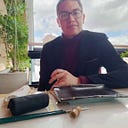Aveux Et Anathèmes- Emil Cioran
This book is composed of a series of aphorisms, all very simple to read and understand… at least at first sight, but much more complicated and complex than it seems if one digs a bit deeper…
A series of small sentences… this is all you will find in this book, but sentences as sharp as razor blades!
Sentences like: “To disarm the envious, we should go out in the street with crutches. It is hardly that the spectacle of our decay which humanizes a little our friends and our enemies”, or still “When one must take a capital decision, the most dangerous thing is to consult others, considering that, except for some misguided ones, it is nobody who sincerely wants our good”…
Emile Cioran is the philosopher of questioning, with a language that knows how to be at the same time simple (“To be modern, it is to tinker with the incurable”), beautiful (“There is charlatan in anyone who triumphs in any field”), researched (“I have just gone through a biography. The idea that all the characters mentioned in it exist only in this book seemed so unbearable that I had to lie down to avoid a breakdown”), chiseled (“The more man advances, the less he will have to convert to”), sculpted (“Tyranny breaks or strengthens the individual; freedom softens him and makes him a puppet. Man has more chances to save himself by hell than by paradise”), surprising (“We should only disturb our friends for our burial. And even then!”)… and above all easily accessible (“Undeniable asset of the dying: to be able to utter banalities without compromising oneself.”)…
Let’s remember that Cioran is willingly sly and provocative… with sentences like “This morning, after hearing an astronomer talk about billions of suns, I gave up washing: what’s the use of washing again? “This reaches its paroxysm notably when he speaks about his favorite themes: religion (“How many missed opportunities to compromise myself with God”), classical music (“What is not heartbreaking is superfluous, in music at least”), the history and philosophy of the West (“All the philosophers I have known were without exception impulsive. The defect of the West will have marked those who should have been unharmed”), man (“If man forgets so easily that he is cursed, it is because he has always been”), life (“The fact that life has no meaning is a reason to live, the only one besides”), death (“By dying, one becomes the master of the world”) …
For let us not forget above all that this is the philosopher of pessimism (“One learns more in a sleepless night than in a year of sleep. You might as well say that a beating is more instructive than a nap”), of boredom (“Boredom is a form of anxiety purged of fear. When one is bored, one fears nothing but boredom itself”), nihilism (“These children I didn’t want, if they only knew the happiness they owe me! “), of sadness (“To have accomplished nothing and to die in overwork”), of suicide (“It is impossible to spend sleepless nights and to exercise a profession: if, in my youth, my parents had not financed my insomnia, I would surely have killed myself”), of loneliness (“So much the loneliness fills me that the least appointment is a crucifixion for me”), of melancholy (“Melancholy redeems this universe, and however it is it which separates us from it”)…
I can only let you discover this little book, and encourage you to read the one who defined himself as “the skeptic of a dying world”…
